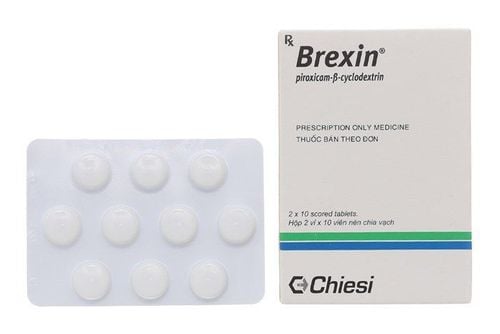This is an automatically translated article.
Cimzia is a drug belonging to the group of drugs that block tumor necrosis factor. It comes as an injection and is used to relieve pain and swelling caused by certain inflammatory conditions (such as rheumatoid arthritis, psoriatic arthritis, ankylosing spondylitis, etc.).
1. Uses of Cimzia
Cimzia is the trade name for Certolizumab pegol or CDP870, which belongs to a class of drugs called tumor necrosis factor (TNF) blockers. With the main active ingredient Certolizumab pegol in Cimzia, the use of the drug is to reduce the impact of an inflammatory substance in the body.
Cimzia is commonly used in adults to treat the following conditions:
Active rheumatoid arthritis (a disease that causes inflammation of the joints) when used in combination with another medicine, Methotrexate, or alone in treatment with methotrexate is not appropriate. Axial spondylitis - Axial spondyloarthritis or axSpA (a disease that causes inflammation and pain in the joints of the spine), including ankylosing spondylitis and non-radioactive axSpA - when x-ray is not showing disease but there are signs of inflammation clear. Psoriatic arthritis (a disease that causes red, scaly patches on the skin and inflammation of the joints) when used in combination with methotrexate or alone when treatment with methotrexate is inappropriate. Plaque psoriasis, a disease that causes red, scaly patches on the skin. Cimzia is mainly used for conditions that are severe, moderately severe or getting worse, or when the patient cannot use other treatments.
2. Before using Cimzia
Before taking Cimzia, you should tell your doctor if you have ever had an allergic reaction to Certolizumab. You may not use Cimzia if you have symptoms of an infection such as fever, chills, cough, sores on the skin, difficulty breathing. breathing, weight loss, diarrhea, or pain when urinating.
Tell your doctor if you have ever had TB, or if anyone in your family has TB. Also tell your doctor if you have recently traveled to rule out tuberculosis and some possible fungal infections.
Cimzia can cause a rare type of lymphoma in the liver, spleen and bone marrow and can lead to death. This occurs mainly in teenagers and young men who have Crohn's disease or have ulcerative colitis. However, anyone with an autoimmune disease may have a higher risk of lymphoma.
Tell your doctor if you have ever had one of the following conditions:
Chronic infection; Hepatitis B (or if you are a carrier of the virus); Cancer; Blood cell disorders; Congestive heart failure ; A seizure; Allergy to latex; Numbness or tingling, or nervous system disorders such as multiple sclerosis; Either you have an appointment for any vaccines, or have recently received a BCG (Bacille Calmette-Guerin) vaccine. It is not known whether Cimzia will harm an unborn baby. Tell your doctor if you are pregnant.
It may not be safe to breastfeed while using this medicine. Ask your doctor about possible risks.
Do not use Cimzia for people under 18 years of age.
3. How to use Cimzia?
Cimzia is injected under the skin. Your healthcare provider can teach you how to properly self-administer your medication. Only when the injection is ready, prepare the injection. Do not inject if the medicine looks cloudy, has changed color, or has particles in it. Ask your doctor for a new medication. Cimzia may increase your risk of bleeding or infection by changing the way your immune system works so you may need regular medical check-ups. Store Cimzia in its original container in the refrigerator. Protect from light and do not freeze the medicine. Remove the syringe from the refrigerator and allow the medication to return to room temperature before injecting. Unopened pre-filled syringes can also be stored at room temperature for up to 7 days, away from heat and light. Throw away the prefilled but unused syringe within 7 days. Each prefilled syringe is for single use only. Use the needle and syringe only once and then put them in the correct place. Keep Cimzia out of the reach of children and pets. Certain other medicines will affect Cimzia, especially: Abatacept Adalimumab Anakinra Etanercept Ggolimumab Infliximab Natalizumab Rituximab
4. Information on dosage and precautions when injecting Cimzia
Usual adult dose of Cimzia for the treatment of moderate to severe active rheumatoid arthritis (RA). Initial dose: 400 mg subcutaneously (200 mg subcutaneously) initially and at weeks 2 and 4, followed by 200 mg subcutaneously every other week. Maintenance dose of 400 mg subcutaneously every 4 weeks in patients with clinical response
Usual Adult Dose for Active Psoriatic Arthritis (PsA):
Initial dose: 400 mg subcutaneously (200 mg subcutaneously) initially and at 2nd and 4th weeks, followed by 200 mg subcutaneously every other week. Maintenance dose of 400 mg subcutaneously every 4 weeks in patients with clinical response This drug may be used as monotherapy when patients are intolerant to methotrexate or when continuation of methotrexate therapy is not appropriate. fit. Usual adult dose for active ankylosing spondylitis: Initial dose: 400 mg subcutaneously (200 mg subcutaneously) initially and at 2 and 4 weeks, followed by 400 mg injection subcutaneously every 4 weeks or 200 mg subcutaneously every 2 weeks.
Usual Adult Dose for Crohn's Disease - Maintenance:
Used to reduce markers of Crohn's disease and maintain clinical response in patients with moderate to severe active disease who respond inadequate with conventional therapy. Initial dose: 400 mg subcutaneously (200mg subcutaneously) initially and at 2nd and 4th weeks. Maintain at 400 mg subcutaneously every 4 weeks in patients with clinical response. The general idea when injecting is:
The injection sites should be rotated. When a dose of 400 mg is required (200 mg should be administered subcutaneously twice and administered at separate sites in the abdomen or thighs). Avoid injecting Cimzia into scars or stretch marks, or into areas of red, bruised, swollen, hard, or tender skin. Ask your doctor before receiving any vaccines while you are being treated with Cimzia. Avoid being around people who are sick or have an infection. Avoid activities that may increase your risk of injury or bleeding. Take extra care not to bleed when shaving or brushing your teeth.
5. Cimzia side effects
Get medical help promptly if you have signs of a severe allergic reaction while taking Cimzia: hives, difficulty breathing, swelling of your face, lips, throat, tongue.
Severe and sometimes fatal infections may occur during treatment with Cimzia . Tell your doctor if you have signs of an infection (such as: fever, chills, muscle aches, cough, sweating, skin sores, fatigue, trouble breathing, painful urination, weight loss, diarrhea.
Stop using Cimzia and call your doctor at once if you have:
Shortness of breath, swelling, rapid weight gain; Pale skin, easy bruising, easy bleeding; Nervous problems - vision problems , dizziness , numbness or tingling feeling, muscle weakness in your arms or legs; liver problems - loss of appetite, right side stomach pain, fatigue, jaundice (yellowing of the skin or eyes); or new or worsening symptoms of lupus - joint pain and skin rash on the cheeks or arms that worsen in the sun The recommendations and precautions given by health care professionals should be patients to follow for safe and effective use of Cimzia.If you have any questions about its use ask your doctor for instructions.
Please dial HOTLINE for more information or register for an appointment HERE. Download MyVinmec app to make appointments faster and to manage your bookings easily.













